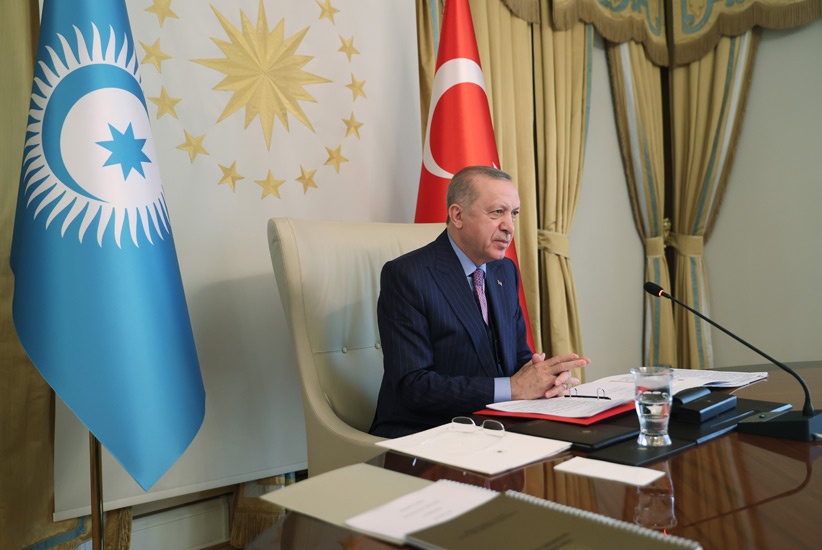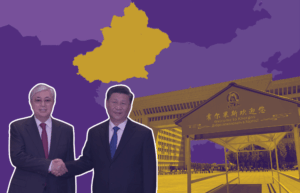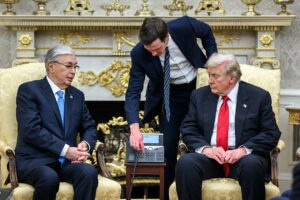Isolated on the international scene and weakened domestically, Turkey seeks support. Turkish powers have chosen a proactive foreign policy in Central Asia and enjoy good relations with countries of the region.This article was originally published on Novastan’s French website on 13 April 2021. As Turkey is increasingly breaking away from its European and American allies, the country seeks to strengthen its partnership and alliance networks. The Turkish Minister of Foreign Affairs Mevlüt Çavuşoğlu met each of his five Central Asian counterparts in March. After visiting Turkmenistan, Uzbekistan and the Kyrgyz Republic from 5-10 March, the Turkish head of diplomacy hosted his Kazakh counterpart, Mukhtar Tileuberdi, in Ankara on 17 March. Afterwards, he went to Tajikistan from 28-30 March. Each of these were opportunities to signal to the world that Turkey must be taken into account in Central Asia.
The challenge of transportation
Mevlüt Çavuşoğlu’s Central Asian agenda is indeed political but also commercial and economic. The Turkish lira has dropped and the economy of the country is not performing well. The Turks seek to develop trade in Central Asia by creating outlets for their businesses and ease the transit of goods coming from China through the “Middle Corridor” fulfilment. On 5 March, the Turkish chief of diplomacy chose Ashgabat, with its immaculate white marble, to begin his diplomatic Central Asia tour. According to the Anadolu agency (AA), the priority for the Turkish delegation dealt with logistics and transport in Turkmenistan. Turkish trucks will be allowed to transit during a time in which they would otherwise be banned due to the Covid-19 pandemic – provided that drivers take a test prior to their arrival at Turkmenbashi port near the Caspian Sea shore, explains Anadolu. As reported by the Turkish newspaper Daily Sabah, Turkmen authorities have announced their desire to permit Turkish Airlines to charter flights to Turkmenabat – the second largest city of the country – as a sign of the privileged status granted by Turkmenistan to their Turkish partner. Previously, commercial flights were not allowed outside the capital city.
Diversifying Turkey’s energy supply
Transportation is an important topic for Turkey because it may enable access to more energy resources. Bayram Balci, the director of the French Institute of Anatolian Studies in Istanbul, said in an interview with Novastan that “Turkey is an industrial country which only produces 3% of its energy needs.” Turkmenistan, possessing the fourth largest natural gas reserves in the world, could become a key player for Turkey if Turkmen gas could be pumped into the country. Read more on Novastan: Turkmenistan became China’s number one gas supplier Therefore, the joint project between Azerbaijan and Turkmenistan regarding the exploration and use of hydrocarbon deposits in the Dostluk field in the Caspian Sea is a topic of interest to Turkish leaders. It is estimated that this hydrocarbon field may hold natural gas and up to 59 million tons of oil, reported Anadolu. Turkey considers this project as an opportunity to diversify its energy intake and desires to involve its public businesses.
A Turkish general consulate in Samarkand
After his visit to Turkmenistan, Turkish Foreign Minister Çavuşoğlu spent three days in Uzbekistan. He visited Samarkand to underline the significance of Turkish-Uzbek relations before continuing to Tashkent. Çavuşoğlu and his Uzbek counterpart Abdulaziz Kamilov inaugurated the new Turkish general consulate on 7 March. This marks an improvement in Turkish-Uzbek relations since 2016, when Uzbek president Shavkat Mirziyoyev came into office. Unlike his predecessor, Islam Karimov, the current Uzbek president champions an open foreign policy which is friendly towards Turkey and its Central Asian neighbours.
In Uzbekistan, Çavuşoğlu underlined the symbolic importance of diplomatic representation opening in what is considered to be the birthplace of Turkish civilisation. While he was paying tribute to the transformation in Samarkand, he recalled that Turkey had been the first country to establish an embassy in Uzbekistan in 1991. As the historical heart of the Silk Road, Turkey did not hesitate to consider its touristic potential. The Anadolu agency (AA) reports that since March 2018, Turkish Airlines has offered direct flights between Istanbul and Samarkand.
The renewal of educational foreign aid service in Kyrgyzstan
For his last stop in Kyrgyzstan on 10 March, the Turkish Minister of Foreign Affairs chose to visit Manas University, a contemporary building situated in Bishkek’s city centre. Founded in 1995 through an agreement between Turkey and Kyrgyzstan, it educates more than 5000 students from 14 different countries. The university courses are free of charge and are taught in Turkish and Kyrgyz, with classes in English and Russian also offered. Besides being a symbol of Turkish soft power, Ankara desires to influence Kyrgyz educational policy as in 2018. Anadolu reports that the Turkish diplomatic chief reminded his counterpart that ”FETO” – Fethullah Gülen’s organisation – was a threat to Turkey and its allies since it is regarded as terrorist group by Turkish authorities. Gülenist networks were once conduits of Turkish soft power in Central Asia via their schools. Fethullah Gülen is in open conflict with Turkish authorities since being accused of plotting a coup in July 2016. Consequently, the authorities requested all partners to close Gülenist schools. Kyrgyzstan denied that request in 2018 due to sovereignty issues and “attachment to these schools which train Kyrgyzstan’s upper class,” an analyst at the Institute of Applied Geopolitics Studies, Magomed Beltouev, explained to Novastan. The Kyrgyz government focused on increasing its power over these schools by changing their status, according to the researcher in this article. The Turks have not seemed to come to terms with this choice. However, the Kyrgyz government has consented to the establishment of a new Turkish organisation, Maarif. Founded by the Turkish state, this new organisation is intended to take over activities previously led by Gülenist schools. Maarif schools, ranging from nursery schools to high schools, should open soon, says the Anadolu Agency (AA).
The premise of a defense cooperation with Kazakhstan
The progress of regional integration with Turkey allows Central Asian republics to diversify partnerships and display to their great neighbouring countries – Russia and China – that they can develop other connections and agreements, declares Balci. However, a Turkish defense cooperation has never materialised, as Russia finds it difficult to accept interference by external actors in what it considers its “near abroad.” Nevertheless, Turkey seems to have new ambitions in Central Asia, bolstered by its success in Nagorno-Karabakh. The Turks have provided combat drones of their own making to their ally Azerbaijan, which have been key to Azerbaijani military superiority. Discussions with Kazakhstan have taken place in order to begin cooperation with the Turkish defense industry, as reported by the Anadolu Agency (AA) in February. Furthermore, Daily Sabah reported the testing of combat vehicles and weapons systems made by two Turkish firms – Otokar and Aseldam – in the Karadanga region in March. Official communications also announced that a defense collaboration has been discussed between Turkey and Uzbekistan. This first step between the two countries resulted in the signing of a military financial cooperation agreement in October 2020. During his tour stop, the Kazakh Minister of Foreign Affairs Mukhtar Tileuberdi had a discussion with his Turkish counterpart and Turkish President Recep Tayyip Erdogan on 17 March. They jointly discussed the “high investment potential” of Turkey but also opportunities to extend cooperation into various fields such as medicine, information technology and energy.
The great ambitions of the past
More broadly, Turkish ambitions in Central Asia have evolved considerably; they are shaped as much by the interests of other states as by the means available to achieve its goals. The five Central Asian republics declared their independence and initiated relations with other sovereign states after the fall of Soviet Union in 1991. Balci explains that Western powers dreaded the possibility of these predominantly Muslim societies yielding to the influence of Iran or Saudi Arabia. “Therefore we thought that Turkey, inspired by a European model, should be a model for these countries as they open up internationally,” adds the researcher. At the same time Pan-Turkism, an ethnic movement advocating the cohesion of nations with Turkic culture and language, was well received by the Turkish elite according to Beltouev. Initially, Central Asian republics agreed to the principle of a Turkish leadership but the Turkey of 1991 is not the same as Turkey today, explains Balci. Less wealthy and less powerful, it proved unable to offer protection and economic opportunities expected by some Central Asian leaders.
A modest cooperation
After the collapse of the Soviet Union, Russia looked unfavourably on foreign incursions into its sphere of influence. The country quickly created regional institutions in order to reaffirm its ascendency over the new Central Asian republics. The Commonwealth of Independent States (CIS) first saw the light of the day in 1991, while the Eurasian Economic Community (EAEC) was founded in 2000, which became the Eurasian Economic Union (EAEU) in 2014. Read more on Novastan: Kazakhstan’s gradual divorce from Russia Turkish leaders had to lower their ambitions; Turkey could not become a protective power in Central Asia. As a result, Turkic solidarity developed mostly around cultural, educational and linguistic cooperation. Aware of the need to respect the cultural and political features of each of their partners, the Turks have focused on the development of bilateral relations. Nevertheless, Turkey has pursued its Turkic integration project. The International Organization of Turkic Culture (TURKSOY) began in 1993 in Almaty, the then capital of Kazakhstan. Many years later, the Turkic Council, initiated in an informal manner in 1992, was officially established in 2009. This intergovernmental forum now includes all Turkic-speaking states except for Turkmenistan, which is strongly attached to its neutrality policy.
A desire to carry regional influence
For Balci, the institutionalisation of the Turkic Council is an ongoing process. The accession of Uzbekistan to the council in 2019 was made possible only thanks to warming relations after the passing of Islam Karimov in 2016. At this point, the only Turkic country not represented in the council is Turkmenistan. Turkish president Recep Tayyip Erdogan declared his desire to see Turkmenistan become a member “as soon as possible” in December 2020,says Anadolu. The myth of Turkic unity remains strong even today. The Turkic Council held a videoconference on 31 March, where various leaders discussed a roadmap for the future called “2040 Turkish world vision.” Baghdad Amreyev, the general secretary of the Turkic Council, discussed this roadmap with the Anadolu Agency (AA). The document aims to establish “better coordination in terms of foreign policy, cooperation in the field of security, free-trade agreements, open borders for transit, as well as the reinforcement of linguistic and alphabet cooperation,” explains Amreyev. He also underlines that it is the “first summit of Turkic leaders after the Azerbaijani victory in Nagorno-Karabakh” in November 2020. It is also a victory for Turkey which seeks to extend its reach beyond the Caucasus. According to Balci, “Turkey’s approach to the Karabakh war has been closely observed by Central Asian states.” Besides the desire to see its power recognized by Russia and the West, Turkey has also “displayed its capacity to militarily support its partners,” adds the researcher. In addition, Turkey desires to play a part in the Afghan issue. The Tadjik capital, Dushanbe, hosted the ninth ministerial meeting of the Istanbul process in late March; it is the fruit of a 2011 Turkish initiative aimed at creating a regional dialogue to support the economic development of Afghanistan. A summit meeting devoted to the Afghan peace process between the Kabul government and the rebels will take place in Istanbul on 16 April, describes the American media The Diplomat. Russia, China, Pakistan and the United States will be present according to the Anadolu Agency (AA).
Beyond talk, few concrete actions
Diplomats and official media tend to highlight Turkey’s good relations with its Central Asian “brothers.” The Turkish Minister of Foreign Affairs also emphasizes the assistance Turkey has been providing to its Central Asian partners during the fight against the Covid-19 pandemic. For instance, Anadolu claims that Turkey is providing Tajikistan with the third highest amount of aid. In a seemingly favourable regional context, Turkey desires to increase its presence in Central Asia. However, Beltouev encourages a nuanced approach. “The economic importance of these countries for Turkey is marginal,” he says. The link with Asia is, more than anything else, symbolic. “Speeches about Turkish brotherhood and Silk Roads are always grandiloquent but there is a clear difference between the discussions which take place and their subsequent translation into bilateral agreements, which are not very ambitious,” concludes the general secretary of the Turkic Council.
Written by Guillaume Gérard
Translated from French by Emma Bekrine
Edited by Mari Paine
For more news and analysis from Central Asia, follow us on Twitter, Facebook, Telegram, Linkedin or Instagram.
 Turkey’s new push into Central Asia
Turkey’s new push into Central Asia 



